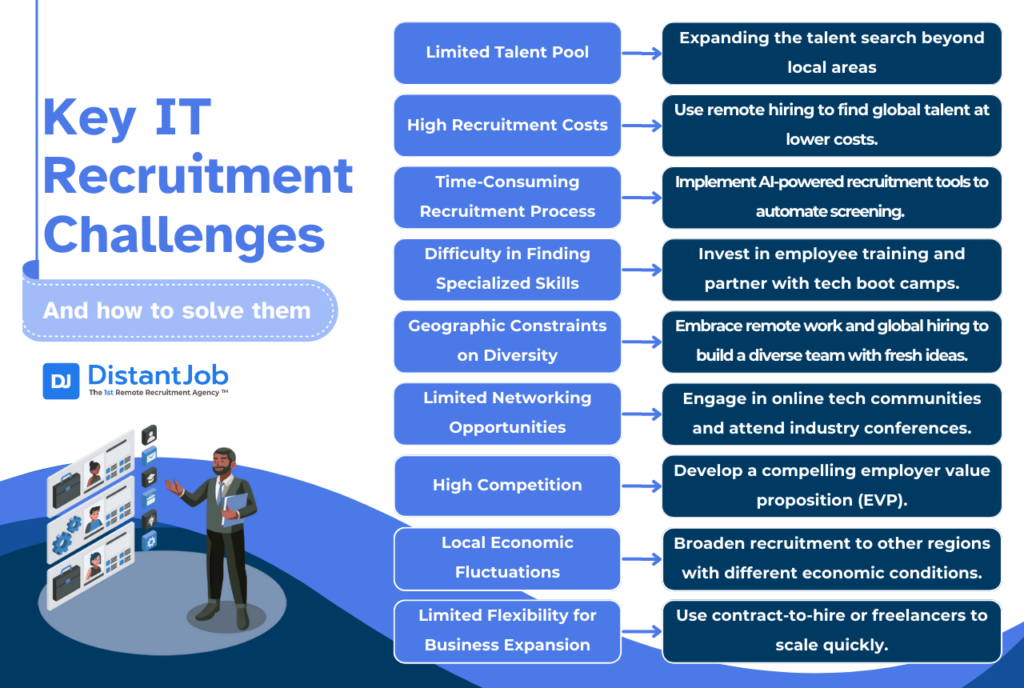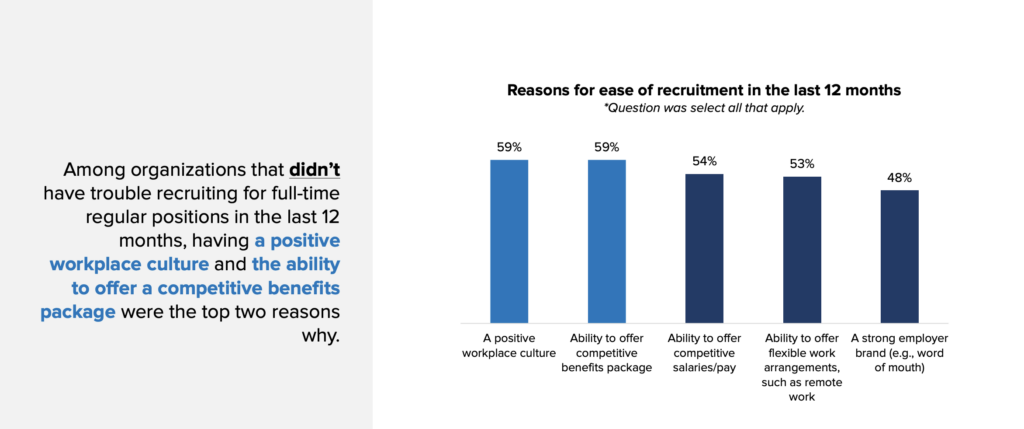In 2025, the U.S. IT industry is still experiencing serious recruitment challenges despite high salaries: a limited supply of tech employees with advanced specialized skills, the challenge of reaching qualified individuals, high recruitment costs due to long hiring processes, and intense competition. In fact, 56% of tech companies report not finding the right candidates because of a lack of technical skills. There are also difficulties with hiring in a limited geographic area, which reduces your access to a more diverse and skilled workforce.
While there are challenges, there are also solutions, even in the IT sector in which we have been active for more than a decade and had to keep up with all the changes. In this post, we’ll share some common challenges faced in tech recruitment, and solutions to overcome them.
Why hiring challenges in the tech sector are more acute than in other industries?
More than 75% of companies in multiple industries are facing recruitment issues, but for tech companies, there is a much more extreme talent shortage than in many other industries where people have more defined requirements, easier training paths, and fewer obstacles to join.
Let’s go over the stats:
- New technologies emerge quickly, creating a demand for specialized skills. This makes it hard to find candidates with up-to-date expertise, especially in fast-growing areas like AI and cybersecurity.
- Tech roles require specific expertise, and positions like software developers have seen a 10-20% increase in demand, but the talent pool remains limited.
- U.S. companies compete with international firms for tech workers, with over 250,000 H-1B visa applications in 2019, showing global competition for top talent.
- Most tech jobs require a bachelor’s degree, with 77% of software developers holding one. This limits the pool of qualified candidates compared to industries with lower educational requirements.
- 57% of U.S. tech workers report experiencing burnout, with mental health issues like anxiety and depression significantly higher than the national average, adding stress to the workplace.
9 Common IT Recruitment Challenges

For recruiters and managers dealing with recruiting IT candidates, here are some challenges you’ll face in the hiring process:
1. Limited Talent Pool
If you were to ask us, “what is the biggest challenge in IT hiring today?”, we would certainly answer that this is the one. Research shows that is a shortage of employees, for highly specialized skills. Certain specialized areas (like cybersecurity, data science, and software engineering) have consistently high demand, but finding people with the right combination of skills and experience is tough.
The skills gap (the mismatch between the skills needed and the available talent) and the need for effective skills-based hiring processes makes the recruiting more complicated.
2. High Recruitment Costs
Another issue is that recruitment is very expensive., with the average cost per hire approximately $4,000.
That cost involves processes such as advertising the position and conducting the interviews. If we’re also adding salaries with high competition, the price just increases too fast. The longer recruiting takes to hire someone, the more it will increase the cost per person, which will negatively affect your budget and, therefore, your growth potential.
3. Time-Consuming Recruitment Process
The recruitment process is extremely slow, which delays filling the role. In fact, the time it takes to hire an IT expert for a senior position is 30 to 70 days from the time the job is posted to the time the person starts working.
With 2,000 applications per job and an average of 5 minutes 51 clicks spent to complete an application, this process already demands 40 to 80 hours over a week or two of the recruiter’s time, magnifying the difficulty for the already busy recruiter and the hiring company. Not to mention the issue that IT recruiters face today because of AI-generated CV’s, where candidates just create their resumes so they can pass through ATS systems without offering any relevant qualifications for the job at a massive scale.
The reality is recruitment needs to keep pace with tech changes. Using technology to your advantage is key to a fast hire and lower attrition rates.
4. Difficulty in Finding Specialized Skills
The demand just keeps increasing as technology moves forward and as we require more specialized expertise. But the supply doesn’t grow in direct proportion with the surge as it should be.
The National Skills Coalition reported that 73% of employers across the country have been affected by employees with a skills gap. That means there’s a good chance that even the people you do find do not have the specialized skills or proper knowledge to deal with the demands of new tech jobs.
In a Dice report, 56% of IT recruiters who were asked said they have struggled to find people with the qualifications they were looking for. While there’s a smaller pool of employees available in general, when the work requires specialization, there are even fewer people with the proper qualifications.
This is the case with new, more specialized technologies, such as artificial intelligence (AI), the cloud, and cybersecurity.
5. Geographic Constraints on Diversity
Sticking to just one location for hiring? That’s a sure way to restrict the diversity of your team.
When you are focused on your own region, it also means you don’t have access to people from different cultures. That’s an important feature for companies because it’s well‐known across the board that employees care about diversity. In fact, a 2022 survey by Glassdoor revealed that 67% of job seekers said a diverse workforce is important when considering a job offer.
This means the world of recruiting as you know it has changed. Both employees and employers demand more diverse employees, yet once again, if you’re focused on one place, you miss out on diverse candidates who could bring valuable skills and unique viewpoints. And this is especially relevant in a world where people are becoming more and more comfortable working remotely.
6. Limited Networking Opportunities
You know networking is key, right? But have you considered how crucial it is for finding the best IT talent? If you’re not visible in the right places, how will top candidates even know you exist? There are plenty of skilled professionals out there who aren’t actively looking for jobs but might be interested if they learned about your company.
When your company is known as a great place to work, top talent is more likely to seek you out. This involves not only promoting your company’s culture and values but also being active in the tech community, whether through sponsorships, speaking engagements, or thought leadership. A strong employer brand makes your company stand out in a crowded market and attracts the kind of talent necessary for long-term success.
7. High Competition
Employees in the IT industry are in high demand across the globe. That means you are not just competing with tech companies in your country; you’re competing with international companies.
According to the latest 2023 Korn Ferry study, the U.S. tech talent shortage will cost $162 billion a year. The fact that tech companies in the Silicon Valley, New York, and Austin areas are competing the most for staff means there are fewer employees available to them.
Therefore with a smaller pool of experts, it means everyone is fighting for the same person. If this person has many options, how do you get the candidate to choose you?
This is where it’s important to understand what is your company’s value proposition. Why is it worth working in your company? Why is it special?Is it because you give employees the best opportunity to learn on the job or because you have a true work-life balance culture? Or is it because you provide a collaborative environment where your team can celebrate wins together? Whatever it might be, you need to feel confident about your company’s value proposition.
Companies who have a positive workplace culture, promoting work-life balance and flexible schedules fill senior positions faster. Data shows 59% of these organizations report no significant hiring challenges for top roles.

8. Local Economic Fluctuations
When your economy is local, you also have regions where there are fewer employees and more employees. Therefore, regions with more employees have a shortage, forcing them to increase salaries when they can afford it. It also means your competition now comes from out of these regions.
So, for example, cities like the San Francisco Bay Area and Austin, Texas, have seen the biggest increases in demand for tech jobs and therefore are experiencing the biggest increases in U.S. salaries, according to Glassdoor and Linkedin.
This can limit you as a business if you do not have the funds to do a lengthy hiring, and it extends the recruitment process even longer.
9. Limited Flexibility for Business Expansion
Recruiters, relying solely on local talent can significantly slow down your hiring process and hinder your ability to scale. A limited regional talent pool, especially with scarce specialized skills, restricts your expansion and prevents you from tapping into new markets and opportunities.
To overcome these challenges, consider expanding your search beyond local boundaries and accessing a broader, more diverse pool of candidates. For example, contract-to-hire arrangements allow you to bring in skilled professionals on a temporary basis, giving you the ability to scale your team according to your needs without committing to long-term, full-time positions.
Strategies to tackle these challenges in recruitment
To tackle the challenges of sourcing IT talent, here are several strategies you can implement:
- Hire Remote. The recruitment process might take longer, but if you allow people to work remotely, suddenly you have access to regions where the talent pool is bigger, the quality is often better, and the price is more affordable.
- Improve the quality of your existing workforce by investing in your current tech employe to ensure they have the right skills. You can invest in better training programs, giving your workforce the specialized skills they need.
- Higher Compensation or Benefits for Specialized Skills: To attract top talent, you should consider increasing compensation for highly skilled professionals in specialized fields like cybersecurity and software development.
- Work with tech bootcamps that offer intensive, job-specific training. They can provide a pipeline of candidates who are ready to produce fast.
- Consider candidates with no degree: The number of self-taught programmers is increasing, and they can be excellent candidates, especially in a remote environment where self-learning and initiative are highly valued.
- Advertise your company: Find better ways to present your company, such as highlighting your company culture, remote work opportunities, and better benefits to attract IT employees.
- Get active in communities like GitHub, Stack Overflow, and LinkedIn. Engage with people in these spaces and let them get to know your company culture.
- Don’t ignore social media. Gen Z is most familiar with social media, and 73% of people aged 18-34 found their last job through social media (according to Recruiterflow).
Conclusion
While recruiting top IT talent can be (and is) challenging, understanding the core obstacles and addressing them strategically can make all the difference. Whether it’s the limited talent pool, high recruitment costs, geographic constraints, or fierce competition, each challenge requires a thoughtful and targeted approach. Implementing strategies like global hiring, flexible recruitment models, and enhancing your employer value proposition is worth it, as it can significantly improve your ability to attract and retain the best talent in the industry. We’re sure of that.
Aligning your recruitment strategies with your business goals is essential, especially as the tech industry continues to evolve. Staying adaptable and proactive in your hiring practices will help you build a strong, dynamic IT team that takes your company to the next level—whatever you want it to be.
Now that you’re equipped with strategies to tackle these challenges, it’s time to take action. And if you feel like expert assistance is what you need, DistantJob is here to support you. We are committed to helping you overcome recruitment obstacles with a focus on global hiring, flexible recruitment models, and strengthening your employer value proposition. Our expertise in sourcing top IT talent ensures that each hire aligns seamlessly with your company’s unique needs and culture. Partner with us to build a powerful and dynamic IT team that will take your business to new heights. Get in touch today, and let’s make these strategies the cornerstone of your success.





